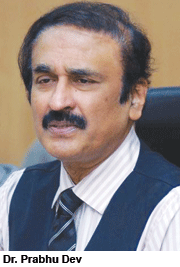The higher education system — and Bangalore University in particular — in the southern state of Karnataka (pop. 62 million) is in deep turmoil.
In the week December 9-15, 3,400 pre-university teachers (classes XI-XII) boycotted classes demanding pay hikes. Three days later, when they returned to work, the state’s showpiece Bangalore University (BU, estb.1964) transformed into a battle ground with over 150 students led by the ABVP (Akhil Bharatiya Vidyarthi Parishad) — the ruling BJP’s student wing — laying siege to the university’s Central College campus. Protesting discrepancies in marks cards issued by the university, they gheraoed vice chancellor Dr. N. Prabhu Dev with one student hurling a flagstaff at him despite heavy police protection. Simultaneously, the university’s lecturers staged a dharna at the same venue to protest against a physical attack on Prof. B.R. Nilanjana, BU’s director of distance education and correspondence courses, by activists of the right-wing Sri Ram Sena protesting delay in conducting distance education exams.
 It’s not just the university’s city campus which has been plagued by protests. During the past month BU’s sprawling 1,100-acre Jnanabharathi campus has also witnessed a spate of demonstrations and rallies staged by postgraduate students and non-teaching staff. According to vice chan-cellor Prabhu Dev, in a letter to Karnataka governor and BU chancellor H.R. Bharadwaj, a “mafia like” situation in BU has been orchestrated by registrar Prof. B.C. Mylarappa, and some university syndicate members who are “hatching a conspiracy against him”.
It’s not just the university’s city campus which has been plagued by protests. During the past month BU’s sprawling 1,100-acre Jnanabharathi campus has also witnessed a spate of demonstrations and rallies staged by postgraduate students and non-teaching staff. According to vice chan-cellor Prabhu Dev, in a letter to Karnataka governor and BU chancellor H.R. Bharadwaj, a “mafia like” situation in BU has been orchestrated by registrar Prof. B.C. Mylarappa, and some university syndicate members who are “hatching a conspiracy against him”.
Prabhu Dev says he is being targeted because “some anti-social elements” are against exam reforms he has initiated. “Some anti-social elements can’t accept that we are going ahead with several overdue examination reforms. In the recent past there have been rising complaints relating to exam malpractices, marks cards scams, and forged degree certificates being issued to students. Now that we have been put an end to all this, anti-social elements whose lucrative sources of income have dried up want me out,” Prabhu Dev told media persons on December 21.
However, according to informed academic opinion, the current problems of Karnataka’s 18 state funded universities — and Bangalore University, which has an annual budget of Rs.260 crores, in particular — are rooted in the wide powers enjoyed by the varsity’s 20-member Syndicate which is dominated by ex offico bureaucrats and government nominated members. As per s. 28(g) of the Karnataka State Universities Act (KSU), 2000, the nominees should be “eminent educationists” but this requirement is liberally interpreted by successive state governments to pack the syndicate with ruling party politicians.
University syndicates are reportedly “super cabinets” of higher education in Karnataka and enjoy wide discretionary powers under s.29 of KSU, 2000. Among the powers of the syndicate are: “…to manage the affairs of the university, in particular to administer the funds and properties”; “to enter into, verify, carry out and cancel contracts on behalf of the university”; “to make recommendations regarding admission of colleges to affiliation”; “to recognise hostels to suspend or withdraw such recognition”.
With syndicate members reportedly “auctioning” jobs to under-qualified personnel especially in the distance education and examination sections, data entry, evaluation, revaluation and totalling standards in particular have plunged precipitously. Currently BU, which has 600 affiliated colleges with an aggregate enrolment of 700,000 students, has 4,200 complaints of marks cards errors registered with it. The errors range from names being misspelt, to single digit instead of double digit marks being entered. Moreover, academic standards and student learning outcomes at this once highly-reputed university have gone from bad to worse. For instance, in a written test recently conducted by the university to select postgraduates for its Ph D programmes, a mere 307 of the 1,591 students who wrote the exam qualified, despite the stipulated pass percentage being a modest 50 percent.
Dr. Narendar Pani, professor of social sciences at the National Institute of Advanced Studies (NIAS), Bangalore identifies political interference and status quo attitudes in government, syndicate and academia as the root causes of BU’s consistent decline. “It’s sad to see a university once run by people of high calibre and excellence, now rigidly controlled by vested interests and politicians. Students’ welfare, improving quality of education and upgrading infrastructure have taken a backseat. Proven administrative and curriculum development processes adopted by higher education institutions such as NIAS and IISc (Indian Institute of Science) should be implemented. But for all this to happen we need strong political will,” laments Pani.
Meanwhile BU chancellor Bharadwaj has appointed a one-man inquiry commission headed by retired judge K. Shivashankar Bhat to probe the recent scams at Bangalore University and recommend remedial measures. But the general expectation is that this report, to be submitted in May 2012, will gather dust like its predecessors, and ‘business’ will continue as usual in arguably India’s largest — but certainly not best — university.
Swati Roy (Bangalore)